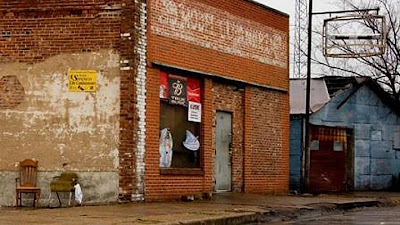Invited Guest: Daryl Thetford- Mississippi Juke Joints
My Mississippi Juke Joint Project was an idea long before it was a reality. Given my fascination with Americana, I am often thought of as a documentary/art photographer. I tend to pick subject matter which is of historical significance and/or documents a way of life that is disappearing. I did not begin my juke joint odyssey to document the history of blues, nor is it my current intention. I was fascinated by the places, the culture, and the geography, and along the way became fascinated with the people and their stories.
Bruno’s Jukebox
Inspired in part by Birney Imes's book, Juke Joint, I knew I wanted to retrace some of his steps, however I do not live near the Delta and have no connections there. The idea of approaching juke joint owners cold and asking to take photographs was overwhelming. Enter Robert Birdsong, Clarksdale native, local historian, and tour guide. This project soon grew, as I recruited my wife, writer and painter Dana Lise Shavin to accompany me and craft an essay about the shoot.
From an essay by my wife Dana Lise Shavin:
The history and social significance of the juke joints are intertwined with the history of the blues movement that grew out of the oppression of blacks in the early 1900’s. The original jukes (or “jooks,” as they were sometimes spelled) were sharecroppers’ shacks turned nightclubs on the weekends. It was there that black men and women were free to gather, drink, and dance, and to hear local entertainers who traveled from plantation to plantation bringing their own personal style of music with them. That music was the personal, repetitive, soulful story of hardship, inequity, and sorrow. It was the social climate of the Delta that provided the early fertile ground for the movement to put down roots.
Hopson Plantation Backstage
New World District, Clarksdale
With the Great Migration, in particular following World Wars I and II, the blues began losing its stronghold in the South even while gaining a new and unprecedented one in the North. The result was the demise of the southern juke joint in its purest form.
Po Monkey's Outside
Today, most of the surviving juke joints of Clarksdale, Mississippi are tucked away on lonely streets or in otherwise abandoned building fronts. Over the past several years, there has been a revival of interest in the blues, with the juke joint festival bringing in a devoted group of national and international music fans who, for a few days each year, pump money and energy into the local Clarksdale economy. But the rest of the year, most of the jukes struggle to hang on, catering to the local population. It was not lost on us that almost all of the juke joints Birney Imes photographed in the early 1980s and 90s are now gone.
Po Monkey's sign
Text and photos © Daryl Thetford
invited by Rhonda Prince













